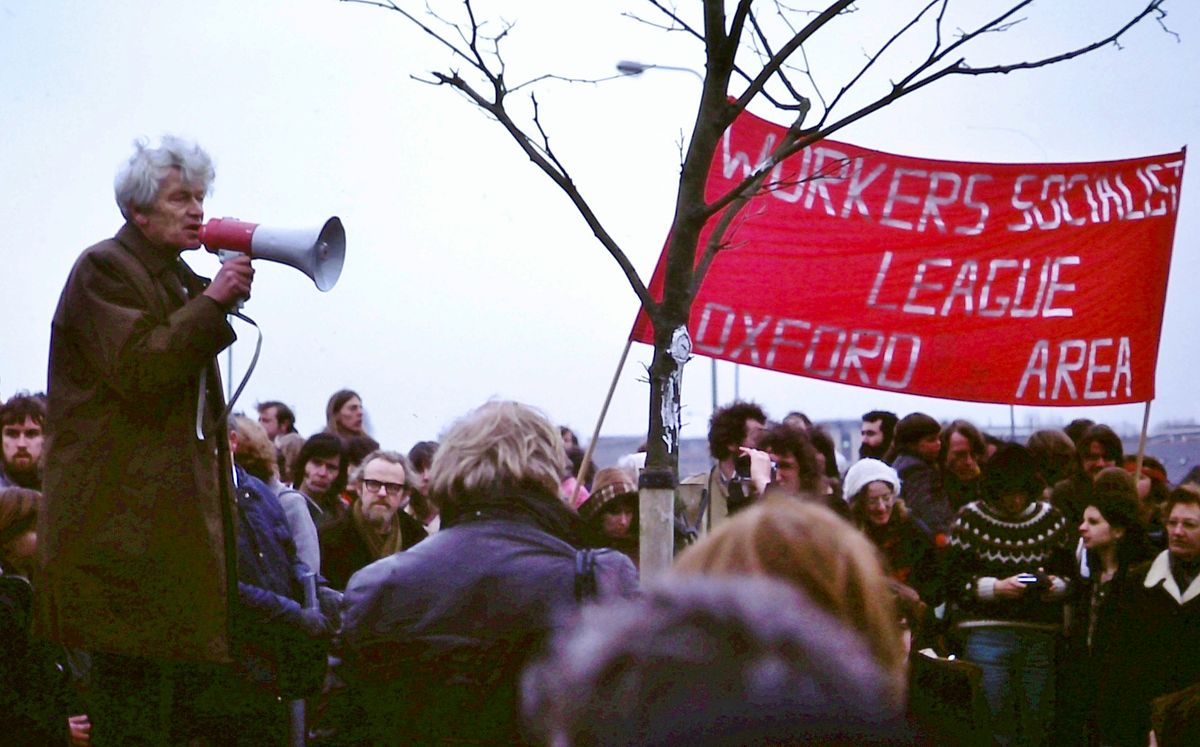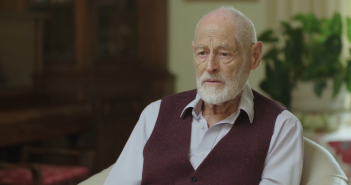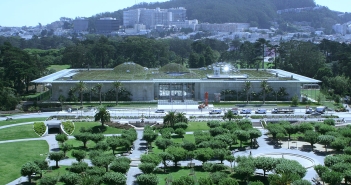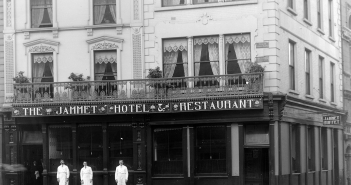Britain has produced its fair share of major public intellectual figures. Having surveyed the legacies of George Orwell, Christopher Hitchens, the Irish-born Edmund Burke and contemporary leading lights John Gray and Jonathan Sumption, I now turn my attention to the great radical historian E. P. Thompson.
Intellectuals often stand apart from a mainstream radical tradition. Hitchens, for example, while broadly adhering to Thomas Paine and The Rights of Man was a contrarian and dedicated atheist who tendentiously supported George W. Bush’s War in Iraq, although perhaps the waterboarding he voluntarily submitted to, and declared to be a form of torture, acted as a form of atonement.
It is unthinkable, however, that Edward Palmer (E. P.) Thompson (1923-1993) would have performed such a volte-face. Thompson held himself squarely within the English radical tradition of William Cobbett, Thomas Paine and Robert Owen, as well as his hero the poet William Blake, and to a lesser extent William Morris. Thompson’s ideology was a form of socialitist libertarianism for the ordinary man.
I grew up reading his work, and indeed watching his grey mane flowing in the wind as he addressed CND rallies, although I understand he was a difficult colleague, a hopeless administrator and an egotist. It seems to have been another case of don’t meet your heroes.
The Making of the English Working Class
His lasting contribution is the seminal The Making Of The English Working Class (1980), possibly the greatest work of history of the twentieth century that emphasised a new form of bottom-up history, related to the subaltern history that was emerging at the same time in former colonial societies. Notably, Edward Said’s Orientalism, which was published in 1978.
Thompson methodology is well captured in the following quotation from this canonical text:
I am seeking to rescue the poor stockinger, the Luddite cropper, the “obsolete” hand-loom weaver, the “utopian” artisan, and even the deluded follower of Joanna Southcott, from the enormous condescension of posterity. Their crafts and traditions may have been dying. Their hostility to the new industrialism may have been backward-looking. Their communitarian ideals may have been fantasies. Their insurrectionary conspiracies may have been foolhardy. But they lived through these times of acute social disturbance, and we did not. Their aspirations were valid in terms of their own experience.[i]
Also, In The Making Of The English Working Class, Thompson places himself firmly within the British rights-driven tradition and focuses on The Liberty Tree, and its essential components of freedom under the law, freedom from arbitrary arrest, trial by jury, habeas corpus and the spectrum of individual rights now under threat of obliteration.
I suspect, just as Lord Sumption is a libertarian, albeit in a different sense, who has spoken out about the restriction on our current restrictions on liberties, Thompson would be horrified at the course of current events in the U.K. ushered in by Coronavirus Emergency legislation and recent Counter Terrorism Legislation.
A #parole loophole could allow the convicted brother of the Manchester Arena bomber – Hashem Abedi – early release!
Barrister David Langwallner (@DLangwallner) discusses today's sentencing and any likelihood of Abedi returning to public life before his time's up. pic.twitter.com/RpFKZ6nhsW
— RT UK (@RTUKnews) August 20, 2020
The Poverty of Theory
Although a Marxist – albeit unlike his contemporary historian Eric Hobsbawm he resigned from the Communist Party of Great Britain after the Soviet invasion of Hungary in 1956 – he was also a historian in the empiricist tradition, distrustful of great meta narratives and the abstract musings of structuralists, which culminated in his famous polemic against Althusser The Poverty of Theory or an Orrery of Errors (1978).
He argued that individuals were agents of activity though caught within the agency of history. They have room to achieve what they do, but only under specific conditions and defined constraints. His sense of the developmental nature of the working class is perhaps best illustrated in the following quote: ‘The working class did not rise like the sun at an appointed time. It was present at its own making.’[ii]
This led to the famous opening passage of The Making of the English Working Class, and his emphasis in his teaching on bottom-up or grassroots analysis, rather than a top-down, theory-driven, approach. He prized empirical evidence derived from the activities of human subjects. A true historian.
That great book in fact has many resonances for our age, not least in how the chiliasm of despair and poverty awakened renewed religiosity – Wesleyan Methodism in particular. His bottom-up analysis pointed to how religion became the opium of the people. This may also explain the rise of religious fundamentalism in our own period of profound economic security.
Thompson demonstrated how local worker communities were often collective, and how a moral economy operated that distributed goods and services according to the respective needs of those who traded and bartered. These localized and community-driven economies were also explored by the late David Graeber in his Debt: the First 5,000 Years (2011).
key point, "it's not our hedonism that's destroying the planet, it's our puritanism," the fact we feel everyone has to be working constantly, regardless of whether there's anything needs to be done, to justify our consumer pleasures
— David Graeber (@davidgraeber) July 14, 2020
It would be a mistake to view Thompson as anti-religious, or to put it another way, he saw a values in religion or in certain religions. On the one hand he rejected what he saw as an authoritarianism implicit in the hierarchical structure of Catholicism, but in Protestantism he found a pragmatism that chimed with his distrust of system-building.
Influence of Antonio Gramsci
Thompson was greatly influenced by Antonio Gramsci, in particular his famous concept of hegemony and a war of position for proletarian emancipation. Gramsci identified an ongoing war of position occurring between the elites and workers, a category which extends conceptually to embrace anyone who is not part of an ever-narrowing plutocracy or billionaire class.
Gramsci allocated a substantial role to intelligentsia and politicians, but also to workers’ councils in altering the course of history to achieve a Communist society. The working class would first have to attain a cultural hegemony before gaining political power he argued: ‘The workers could only win if they achieved cultural hegemony before attaining political power.’
Occasionally, he seems to identify it (hegemony) with political power exercised by coercion, but as a rule he distinguishes the two concepts, so that hegemony signifies the control of the intellectual life of society by purely cultural means. Every class tries to secure a governing position not only in public institutions but also in regard to the opinions, values and standards acknowledged by the bulk of society. The privileged classes in their time secured a position of hegemony in the intellectual; as well as the political sphere; they subjugated the others by this means, and intellectual supremacy was a precondition of political rule. The main task of the workers in modern times was to liberate themselves spiritually from the control of the bourgeoisie and the church and to establish their own cultural values in such a way as to attract the oppressed and intellectual strata to themselves. Cultural hegemony was a fundamental and prior condition of attaining political power. The working class could only conquer by first imparting its world view and system of values to the other class who might be its political allies; in this way it would become the intellectual leader of society just as the bourgeoisie had done before seizing political control.[iii]
The Rule of Law
Thompson diverged from conventional Marxist theory in his approach to the role of law. A conventional Marxist view consider this as:
by definition a part of a ‘superstructure’ adapting itself to the necessities of an infrastructure of productive forces and productive relations. As such, it is clearly an instrument of the de facto ruling class: it both defines and defends these rulers’ claims upon resources and labour-power – it says what shall be property and what shall be crime – and it mediates class relations with a set of appropriate rules and sanctions, all of which, ultimately, confirm and consolidate existing class power. Hence the rule of law is only another mask for the rule of a class. The revolutionary can have no interest in law, unless as a phenomenon of ruling-class power and hypocrisy; it should be his aim simply to overthrow it.[iv]
In contrast Thompson was a qualified supporter, arguing that: ‘Law may be seen,’ he argued, not only instrumentally and ideologically, but also ‘simply in terms of its own logic, rules and procedures – that is, simply as law.’
In Whigs and Hunters: The Origin of the Black Act (1975) Thompson argues against the idea that the law could be reduced to a superstructure, reflecting the class interest of the ruling class, but offered instead a more complex truth inherent to which was the fact that ‘it could not be reserved for the exclusive use only of their own class.’
He concluded that the law did mediate existing relations and was ‘a superb instrument by which these rulers were able to impose new definitions of property to their even greater advantage,’ for example, in terms of his historical works by extinguishing agrarian use-rights and by enclosures but on the other hand, the law mediated these class relations through legal forms, which imposed, again and again, inhibitions on the actions of the rulers.
Also, Thomson argued that rulers ‘believed enough in these rules, to allow, in certain limited areas, the law itself to be a genuine forum within which certain kinds of class conflict were fought out.’ On occasion the government itself was defeated in the courts: ‘Such occasions served, paradoxically, to consolidate power and to enhance its legitimacy,’ but also ‘to bring power even further within constitutional controls.’
Thompson suggested that this role of law was in essence: ‘a legacy as substantial as any handed down from the struggles of the seventeenth century to the eighteenth and a true and important cultural achievement,’ and further that ‘the notion of the regulation and reconciliation of conflicts through the rule of law’ was ‘a cultural achievement of universal significance’
He asserted that though imperial in its origin, the rule of law inhibited that imperial power such that:
Transplanted as it was to even more inequitable contexts, this law could become an instrument of imperialism. For this law has found its way to a good many parts of the globe. But even here the rules and rhetoric have imposed some inhibitions upon the imperial power. If the rhetoric was a mask, it was a mask which Gandhi and Nehru were to borrow, at the head of a million masked supporters.
His classic position from Whigs and Hunters is encapsulated in the following statement:
But the rule of law itself, the imposing of effective inhibitions upon power and the defence of the citizen from power’s all-intrusive claims, seems to me to be an unqualified human good. To deny or belittle this good is, in this dangerous century when the resources and pretensions of power continue to enlarge, a desperate error of intellectual abstraction. More than this, it is a self-fulfilling error, which encourages us to give up the struggle against bad laws and class-bound procedures, and to disarm ourselves before power.
Later he elaborated that:
If I have argued elsewhere that the rule of law is an ‘unqualified human good’ I have done so as a historian and a materialist. The rule of law, in this sense, must always be historically, culturally, and, in general, nationally specific. It concerns the conduct of social life, and the regulation of conflicts, according to rules of law which are exactly defined and have palpable and material evidences – which rules attain towards consensual assent and are subject to interrogation and reform.
Criticism
Thompson has been criticised for upholding what is considered by some to be the conservative doctrine of the rule of law, and not an unqualified good according to Morton Horowitz; or as Adrian Merritt argues: its logic is ‘the logic of class formation.’
Bob Fine also suggests that the Rule of Law need not be characterized as ‘an unqualified human good’ for one to recognize that it is superior to bald authoritarianism, and that other institutions such as democratic elections limit power and that, rather than limiting power, the law serves in various ways to enhance the power of the ruling class.
Nonetheless, in Thompson’s defence it can be argued he is only suggesting that the rule of law was neutral and not conservative and neither promoted nor impeded substantive justice. In this context Thompson insists that he was ‘not starry-eyed’ about the law. On the contrary he was bent on ‘exposing the shams and inequities which may be concealed beneath this law.’
Nevertheless, for Thomson the rule of law was ‘an unqualified human good,’ because it is invariably superior to unbridled authoritarianism, and what makes the rule of law an unqualified human good for Thompson is the lack of any available substitute mechanism for limiting arbitrary power in complex societies.
His faith in the common man is again evident in his assessment of jury trial.
Jurors have found, again and again, and at critical moments, according to what is their sense of the rational and just. If their sense of justice has gone one way, and the case another, they have found “against the evidence,” … the English common law rests upon a bargain between the Law and the people: The jury box is where the people come into the court: The judge watches them and the people watch back. A jury is the place where the bargain is struck. The jury attends in judgment, not only upon the accused, but also upon the justice and the humanity of the Law.
British Empirical Tradition
Like all British empiricists from Burke to Hitchens and Orwell, and especially as an historian, Thompson was acutely sensitive to issues of truth and lies, shabby cover ups, semi-truths and disinformation.
The Twelve Days of Cassandra Voices:
On the 5th day… for those of an intellectual bent, David Langwallner reclaims perhaps Ireland’s foremost public intellectual, Edmund Burke, from the jaws of conservatism:https://t.co/xYR31JeaqH#essentialholidayreading— CassandraVoices (@VoicesCassandra) December 29, 2019
Thompson’s book on Blake, his last, endorses the attack on the beast, which is in effect the state or state religion classified by Thomson as the whore of Babylon.
As an educationalist he was incidentally a humanist, recognising the importance in his teaching of objectivity and tolerance, but seeing these not as important matters in and of themselves – in that we are all a product of our time – but as offering useful educational and heuristic methods.
His focus on ordinary people, on human rights and the rule of law and his distrust of great systems and absurd generalisation and abstractions is now of great relevance, as are his warnings and research into religious fundamentalism. Alas, E.H. Thompson’s devotion to the determination of facts, detail and accuracy is sorely lacking in contemporary discourse.
[i] E. P. Thompson, The Making of the English Working Class, Victor Gollancz Ltd, London, p.14
[ii] Ibid, p. I
[iii] see Lezsek Kolakowski: Main Currents of Marxism: Its Rise, Growth and Dissolution Volume 1: The Founders, Oxford Paperbacks, Oxford pp.241-42
[iv] Thompson, in Beirne and Quinney, Marixism and Law, Wiley, New York 1982




